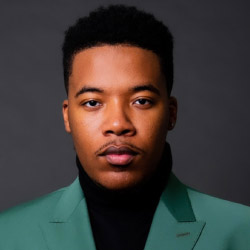
Selections from Handel’s Messiah
April 6-7, 2024
Aaron Crouch
Biography
An artist and activist, African-American tenor, Aaron Crouch has been described by the Huffington Post as “riveting vocally and as an actor.” Originally from Bowie, Maryland, he is a recent graduate of the prestigious Curtis Institute of Music in Philadelphia, studying under the guidance of Mikael Eliasen and Jonathan Beyer. During the 2021/22 season, Mr. Crouch will return to the Glimmerglass Festival to debut the role of Tamino in Kelley Rourke’s storybook adaptation of The Magic Flute. Additionally, he will reprise the role of The Son in Jeanine Tesori and Tazewell Thompson’s award-winning opera, Blue, at Michigan Opera Theatre and Pittsburgh Opera. He will also appear as Matthew Gurney in Tulsa Opera’s production of Emmeline. In May 2021, Mr. Crouch was seen as Jupiter in Pittsburgh Opera’s production of Händel’s Semele. He has performed in concerts with Caramoor and the New York Festival of Songs, notably the Schwab Vocal Rising Stars concert, as well as Myths to Live By, co-created by Steven Blier and Julia Bullock. Mr. Crouch has been a soloist with the New World Symphony for their Ravel Journey Concert. He also performed in an all- Bernstein concert with the Philharmonic of Southern New Jersey for Bernstein’s centennial in 2019. During his time at the Curtis Institute of Music, Mr. Crouch performed several notable roles such as Don Ottavio in Mozart’s Don Giovanni, Lensky in Tchaikovsky’s Eugene Onegin, Prunier in Puccini’s La Rondine, and Anthony in Sondheim’s Sweeney Todd. He also starred in the premiere of a new work by Nick DiBerardino, Anansi and the Great Light commissioned for the Curtis Family Concert Series. A Gold Medalist at The YoungArts Foundation Awards in 2017, he also won First Place in the Sue Goetz Ross Voice Competition, Shirley Rabb Winston Voice Competition (Maryland chapter), and Classical Singer Vocal Competition (University Intermediate Division). He received Third Place in The Rochester International Vocal Competition and won an Emerging Artist Award from the Opera Index Vocal Competition in 2019.
______________________________________
The calling of faith and music
For Aaron Crouch, singing is much more than a career.
“I feel like I have a calling to music,” says the son of two Baptist ministers. “The audience-artist relationship is so intoxicating it’s having the opportunity to exchange energy in a very unique and powerful way. We each give something to each other, and it fuels me.”
On April 6 and 7, local audiences will experience that relationship and energy when Aaron Crouch is the featured tenor soloist in New West Symphony’s presentation of Handel’s “Messiah.”
It is an opportunity for them to hear this rising young opera star whose powerful singing and acting has gathered enthusiastic response from audiences and critics. That’s something Aaron, still in his 20s, still can’t quite comprehend, especially given that he discovered the power of classical music relatively recently.
The youngest of six children born to a husband-and-wife pastor couple in Mitchellville, Maryland, Aaron “grew up in church,” singing and harmonizing Gospel music with his older siblings.
“I loved singing,” he recalls, “but not until middle school did I have a choir teacher who thought I had something special.”
That teacher directed him to nearby Suitland High School’s Center for the Performing Arts, which introduced Aaron to classical music.
“I thought it was super corny at first, and a lot about opera and classical went right over my head,” Aaron admits. “But as I listened and studied and practiced, I saw how Gospel and opera offer a similar way of communicating with the listener. In both, the emotion in the words and music come through; it’s music that comes from the heart.”
His prowess and talent at Suitland drew Aaron to attend the prestigious Curtis Institute of Music in Philadelphia, though he didn’t yet envision music becoming his career.
“I told my music director that I was planning on being a teacher,” he says. “He told me, ‘Don’t play it safe; give yourself a chance.’ He could see I had something more to offer.
“And when I saw productions at Curtis with the older students, especially older black students, performing, I began to see myself in their position, and I wanted to work harder to get where they were. The more I performed, the more I thought, ‘Maybe there is something to this kind of a career.’”
Aaron began earning multiple first place awards in singing competitions including the YoungArts Foundation Awards, Sue Goetz Ross Competition and the Schmidt Youth Vocal Competition. At Curtis, he played leading roles in productions of “Don Giovanni,” “La Rondine” and “Sweeney Todd.”
Those experiences led to a series of high-profile performances in operatic productions throughout the country. Among them: The Son in “Blue” for Opera Philadelphia and Pittsburgh Opera; Gondolier in “Otello with Washington National Opera; and Lindoro in “L’italiana in Algeri” with Tulsa Opera.
For the 2023-24 season, he was Count Almaviva in Virginia Opera’s production of “Il Barbiere di Siviglia,” and recently joined headliner Morris Robinson for the second iteration of “Morris & Friends: An Evening of Opera & Gospel” at Washington Adventist University.
And, after five years of “non-stop opera,” Aaron is assuming an additional role, connected to his roots in church ministry. He is a youth worship leader at First Baptist Church of Glenarden, Maryland.
“During this last year,” he says, “I had this feeling I was missing something in my life, so it was like divine intervention to be asked to be involved with the young people of this church. And now I help lead worship with kids 12 to 18, and it’s an amazing opportunity to reach them musically and spiritually.”
Soon Aaron will be in Southern California, performing one of his favorite pieces. “My ‘Messiah’ score is on my music stand right now — a very used and beat-up score,” he says, laughing, and thinking of the challenge he faces when singing the classic work.
“My second favorite aspect of ‘Messiah’ — aside from singing it — is listening to the other soloists and the chorus sing their parts,” he says. “It’s a long time between when I sing ‘Ev’ry valley shall be exalted’ near the beginning to when I sing “Thou shalt break them with a rod of iron.’ I’m a very expressive person, and it’s hard for me to control myself when I hear great singers at work. That’s when I wish I could be in the audience.”
“But I love this piece so much because I get to be two types of tenor: soft and florid singing early, and very energetic singing later. And as a Christian, I appreciate and celebrate the story of the coming of the Messiah, and the excitement of sharing the good news of the Resurrection. That’s always fun to be part of.”
